
Youth Talks: Russia and the Benelux countries build up dialogue
/ Главная / Russkiy Mir Foundation / Publications / Youth Talks: Russia and the Benelux countries build up dialogueYouth Talks: Russia and the Benelux countries build up dialogue
Svetlana Smetanina
The Youth Talks debate club at the Center for the Benelux Languages and Cultures has launched its new session on July 17th. The Center director Maria Pushkova and students Anna Balashova and Daniil Volkov talk about their projects, for the most part associated with commemoration of World War 2 and the Belgian Resistance.
– Maria, what activities is the Center for the Benelux Languages and Cultures at the RSUH (Russian State University for the Humanities) engaged in?
– I have worked in the Benelux Center since 2010 and been its director since 2017. Up to this point, the Center has been mainly engaged in teaching activities. I joined it as a teacher of Dutch. Initially, the Center was established as a platform for students studying Dutch and having major in European Studies. Those were the students of the Faculty of International Relations and Foreign Regional Studies of the Russian State University for the Humanities.
After my appointment as the director of the Benelux Center, we decided to expand our activities and turn the Center into an international platform for all those interested in Dutch and the Benelux regions. Students of the Russian State University for the Humanities, Moscow State Linguistic University, Moscow State University, and Moscow State Institute of International Relations take an active part in our Center’s activities. We cooperate with the East European Association of Netherlandists (DOEN), the Dutch Language Union (Taalunie), universities in Belgium and the Netherlands. Experts from the Netherlands and Belgium, representatives of the Dutch-speaking business community in Moscow regularly give lectures at our Center.
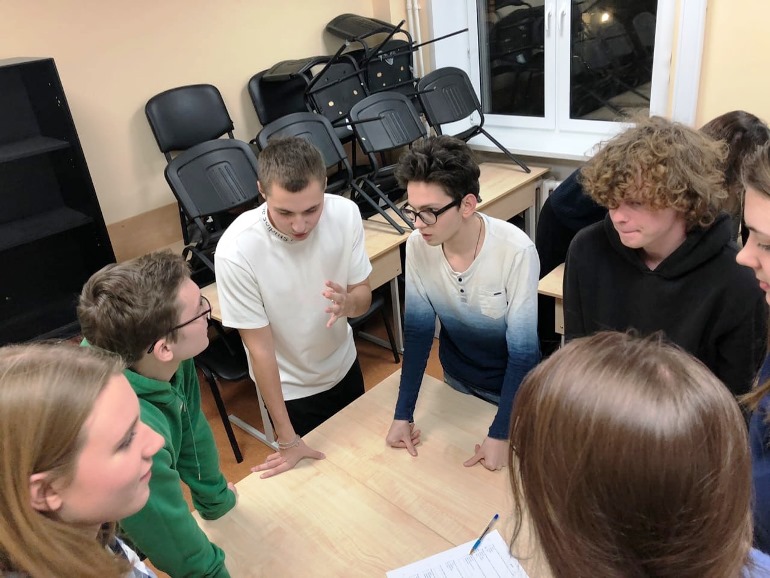
RSUH hosted the International Student Congress of the Netherlands twice - in 2017 and 2019.
One of our most popular projects is summer schools, which we arrange together with the University of Groningen (Netherlands). This year, for the first time, classes are held in the remote mode.
In general, moving online has made our tasks easier - we transferred all our events to online environment, and now we can invite a much wider circle of our friends; people from other cities and countries have the opportunity to join us if they wish to. We are very active in social networks - Vkontakte, Facebook, Instagram. We have recently launched our YouTube channel and plan a series of talk podcasts on various topics, including culture, history, economics, the current state of relations between Russia and the Benelux countries.
Our efforts in social networks enabled us to attract a moderately large group of people who are interested in Belgium and the Netherlands, as well as our activities.
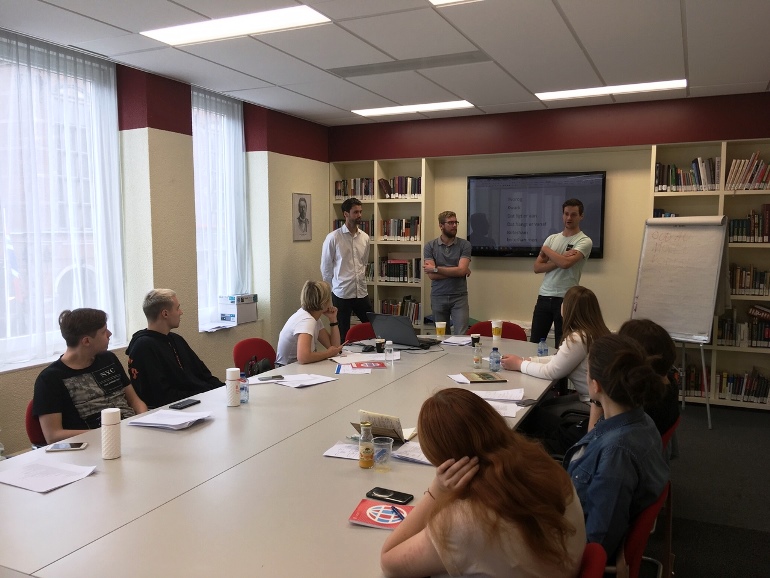
Last October our Center joined another activity, Historical Memory project. Its task group is headed by Alexander Khinshtein, a member of the State Duma of the Russian Federation. I am the coordinator for Belgium within the group. This is an incredibly interesting project, since its subject, namely the Belgium Resistance during World War II, has not been sufficiently covered and studied. It may be news to many people that a lot of Soviet prisoners of war - about 30 thousand people - were taken to the territory of Belgium. They were sent to work in quarries and mines in the foothills of the Ardennes. And it was the area where the Belgian partisans were active. Many of the Soviet prisoners of war became members of the Resistance. Nowadays, we have to recover their names that were almost forgotten.
I took up this work with great interest - I visited the Ardennes, where the most of military operations by the Resistance had taken place, and met incredibly interesting people there. We have established cooperation with the Russian Center for Science and Culture (RCSC, Brussels, Belgium) headed by Vera Bunina, its director, and the Meridian, an association of compatriots headed by Ella Bondareva, its president. The Meridian Association works together with patriotic organizations of veterans in Belgium and is engaged in commemorating heroes of the Resistance.
I told my students about this project, and they also became interested. So we decided to organize a student interuniversity conference under the title of Resistance - Forgotten Pages of the War. However, the circumstances made us change the original plan. We decided to postpone the event until autumn. Instead, Russia – Belgium: 75th Anniversary of Victory conference was held online, and all our friends and colleagues from Russia, Belgium and the Netherlands were invited to participate.
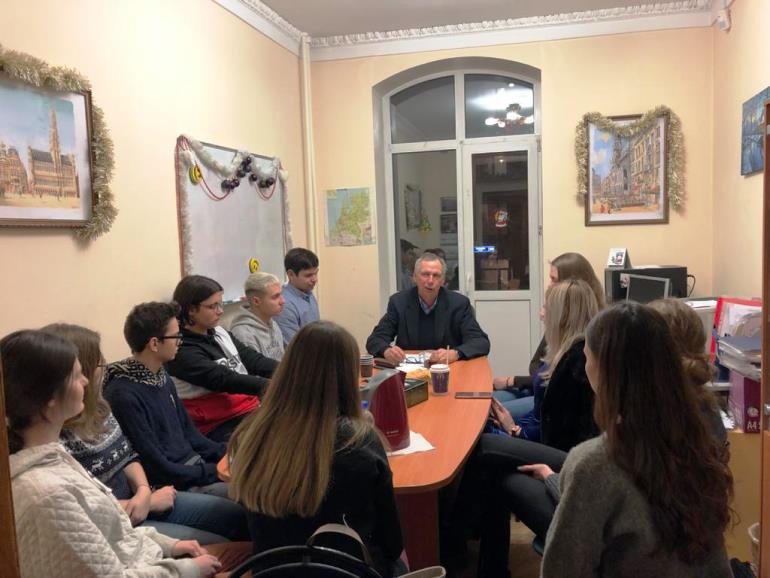
The conference was a great success - there were a lot of guests. We got associated with the Volgograd Panorama Museum (the Museum of the Battle of Stalingrad), where a lot of documents about the Brigade for the Motherland are kept. It was the largest partisan brigade in Belgium, and its hardcore included people from the Volgograd, Samara and Saratov regions. So we came up with a plan to make a "crowdfunded film" about the Brigade for the Motherland. We intend to shoot the film in the partisans’ home grounds and in the Ardennes. The film script is currently under works.
The program of the Historical Memory project includes establishment of the Resistance Museum in the Ardennes. Its physical implementation was put on hold because of the lockdown. Therefore, for now we decided to make an online museum and prepare a video presentation of it. Students were happy with the idea and have already started its implementation.
– The first meeting of the Youth Talks will take place on July 17th. How did the idea of a youth debate club come about, what are you going to talk about?
– While working on the Historical Memory project, we met a lot of interesting, wonderful people from Belgium. Then there came an idea to create another project: Cross-cultural Dialogue: Russia and the Benelux Countries. So, the Youth Talks is a youth debate club enthusiastically established by our students as a part of the latter one. It will be a platform for humanitarian dialogue and communication between young people from Russia and the Benelux countries.
Rossotrudnichestvo, our university, and the Meridian Association offered us support. One of our first major joint projects will be the web-based Resistance Museum. An exhibition dedicated to the 75th anniversary of the end of World War II and the heroes of the Resistance will take place in November, at least we hope so, and the online museum will be presented there.
Our student volunteers are now collecting materials and writing articles about heroes of the Resistance, which will soon be translated into French and published in an issue of Méthode, a French magazine, dedicated to the partisan movement. The Meridian Association assisted in collection of the materials. Together with the Belgian Association of Veterans, they plan to publish such materials in Russian as a part of the Memorial Book collection.
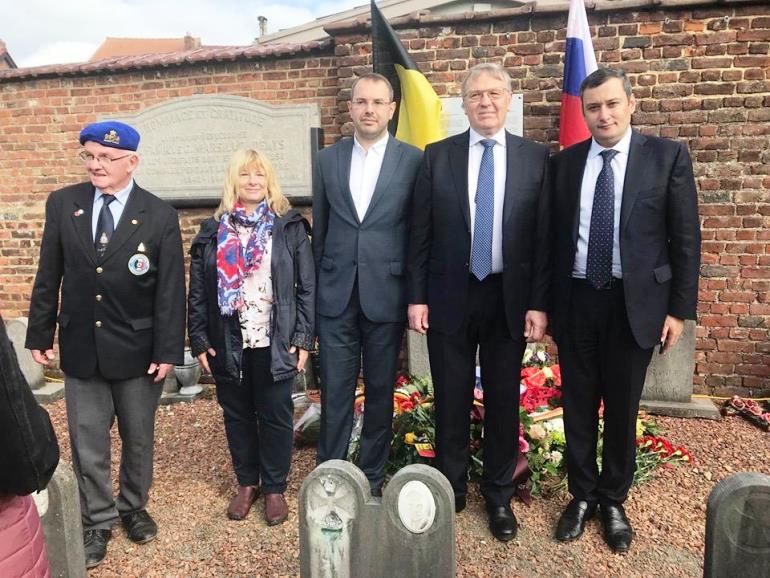
Our students participate in the Holocaust project, which is also dedicated to the 75th anniversary of the war end. Our subject is Holocaust in the Netherlands. The main issue under review is the following: how did it come that the Dutch citizens of Jewish origin had been surrendered to concentration camps without any resistance? This is a very difficult and painful topic. The relevant information is also now been collected.
The students have prepared a video presentation (click for English subtitles!) on the threshold of the first Youth Talks event. It will be held as a roundtable discussion under the title of Let us get to know each other. We invited young people from Belgium, the Netherlands and Russia to participate in it.
But, of course, our club activities are not limited to historical memory only. We intend to get the club members acquainted with Russian culture, history, and Russian language. Children of compatriots living in Belgium and the Netherlands who wish to improve their Russian language and learn more about Russia also want to join our club.
Our plans include lectures and discussions, watching films, thematic quests, and participation in a youth camp in Belgium. Learning Russian Together, a conversational club, will also start its work. Furthermore, we are going to touch upon such a historical topic as Peter the Great and Belgium.
– Have any of the young local residents - Belgians and Netherlanders - expressed a desire to participate in the work of your club??
– Of course. We are friends with everyone. Trainees from other countries come to our university. We have a joint project with University of Groningen in the Netherlands - this is a summer school which students from Russia attend every year. Unfortunately, this year they cannot go there physically, but our summer online school started classes on July 8, and it is open for RSUH students, as well as for everyone from other Russian universities.
I would like to add that in 2019 our Center for the Benelux Languages and Cultures received the prestigious RusPrix Awards for Contribution to the development of Russian-Dutch relations in culture and education.
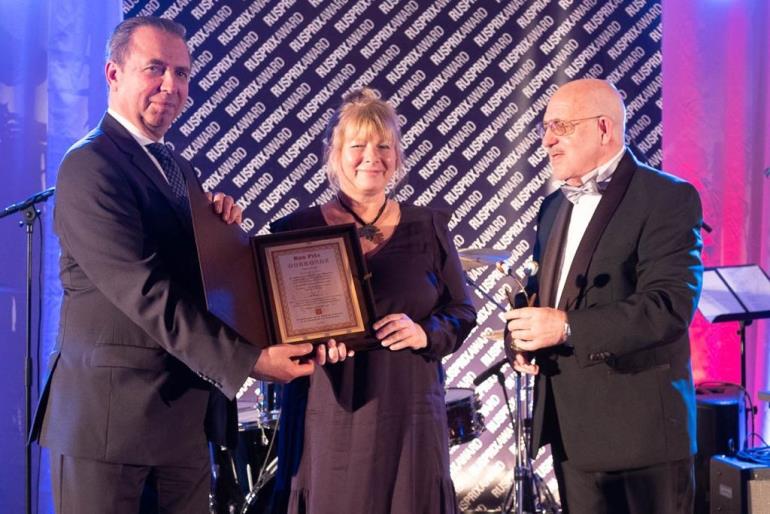
Anna Balashova and Daniil Volkov, active members of the Center’s team, spoke about their contribution into establishment of the platform for youth dialogue.
Anna Balashova, a second-year student and assistant director of the Center for the Benelux Languages and Cultures:
– The idea to make a youth debate club (such as the Youth Talks) was born quite recently. Russia - Belgium: 75th Anniversary of Victory, our spring online conference, was attended by many participants from Belgium. Before that, the Benelux Center had mainly cooperated with the Netherlands, so we found it interesting to make friends with Belgium. It turned out that there are students there who want to study Russian language and culture. So we thought - why not? There is all the more reason for this as we already have extensive experience in holding such events. Why don’t we try to make a communication platform for us all – students and youth in Russia, Belgium and the Netherlands?
We already have students who are ready to act as presenters or hosts - to discuss films and various topics, to hold meetings of conversation clubs.
The first event is to take place on July 17. We will get to know each other, see Russian proficiency of foreigners in our audience, so we can understand how to build up a dialogue and select topics in future. Our compatriots, who lack communication in Russian, have also subscribed for the club. Everything will be happening online, since people are in different countries. Moreover, during the lockdown we mastered the online environment. It turned out that it has many more advantages than the offline one. For example, one of the latest events - an online lecture with the cultural attaché of the Netherlands Embassy – was attended by about 80 people.
We have been receiving requests with topics for future discussion from Belgian and Dutch members of our club. They want to focus on history and politics, because our countries' views on such issues are often different. They also want to learn more about Russian culture, its books and films.
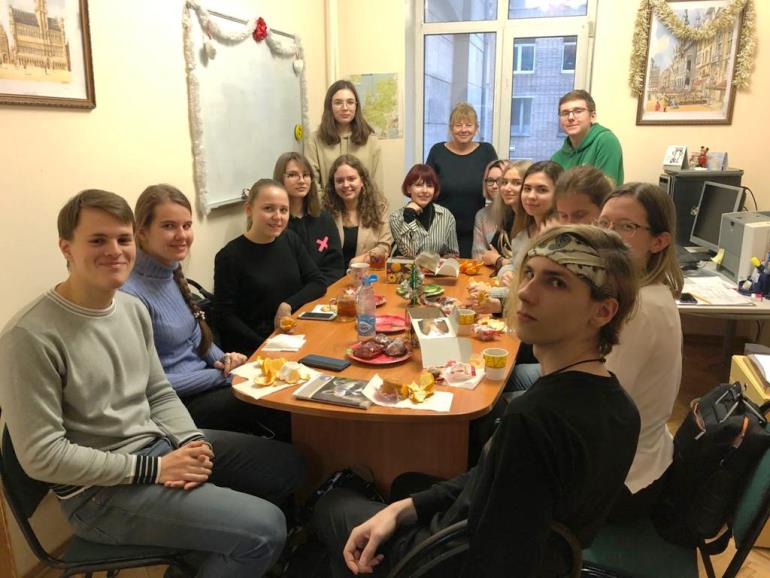
Daniil Volkov, a second-year student and volunteer of the Benelux Center:
– As a part of the Historical Memory project, we will make the web-based Resistance Museum dedicated to partisan operations in Belgium. At this stage we plan to make a web-site with general information about the Resistance movement. Later on, the virtual museum will go online. Then those people who are unable to visit Belgium will see the web-based museum.
The Meridian Association helps us to search for materials and prepare them for the museum. They send us information about members of the Resistance, articles, literature, interviews with them. They will also translate all the materials into several languages. It is planned to launch the museum web-site in French, English, Dutch and Russian languages.
Yes, the project is going to be rather challenging, but no one shall be forgotten. The museum web-site will be ready around September. And the final version of the online museum will be launched simultaneously with opening of the museum in the Ardennes. The preparation works are well underway.
We also intend to make video presentation of the online museum and the whole project in general. It will be a story of how we collect information and write articles based on materials found. We will also share about work on the Memorial Map, a project aimed to collect information about Russian soldiers buried in Belgium.
In conclusion, I would like to say that the main goal of our Benelux Center is to keep a dialogue going despite differences between our countries. There are good reasons why the Dutch came up with a polder model - when all parties meet at a round table, talk to each other and find a consensus.
New publications

 Mikhail Kalatozov, a director who transformed the world of cinematography in many ways, was born 120 years ago. He was a Soviet film official and a propagandist. Above all, he was capable of producing movies that struck viewers with their power and poetic language.
Mikhail Kalatozov, a director who transformed the world of cinematography in many ways, was born 120 years ago. He was a Soviet film official and a propagandist. Above all, he was capable of producing movies that struck viewers with their power and poetic language.  Ukrainian authorities have launched a persecution campaign against the canonical Ukrainian Orthodox Church (UOC), the biggest one in the country's modern history. Over the past year, state sanctions were imposed on clergy representatives, searches were conducted in churches, clergymen were arrested, criminal cases were initiated, the activity of the UOC was banned in various regions of the country, and monasteries and churches were seized.
Ukrainian authorities have launched a persecution campaign against the canonical Ukrainian Orthodox Church (UOC), the biggest one in the country's modern history. Over the past year, state sanctions were imposed on clergy representatives, searches were conducted in churches, clergymen were arrested, criminal cases were initiated, the activity of the UOC was banned in various regions of the country, and monasteries and churches were seized.  When Nektary Kotlyaroff, a fourth-generation Russian Australian and founder of the Russian Orthodox Choir in Sydney, first visited Russia, the first person he spoke to was a cab driver at the airport. Having heard that Nektariy's ancestors left Russia more than 100 years ago, the driver was astonished, "How come you haven't forgotten the Russian language?" Nektary Kotlyaroff repeated his answer in an interview with the Russkiy Mir. His affinity to the Orthodox Church (many of his ancestors and relatives were priests) and the traditions of a large Russian family brought from Russia helped him to preserve the Russian language.
When Nektary Kotlyaroff, a fourth-generation Russian Australian and founder of the Russian Orthodox Choir in Sydney, first visited Russia, the first person he spoke to was a cab driver at the airport. Having heard that Nektariy's ancestors left Russia more than 100 years ago, the driver was astonished, "How come you haven't forgotten the Russian language?" Nektary Kotlyaroff repeated his answer in an interview with the Russkiy Mir. His affinity to the Orthodox Church (many of his ancestors and relatives were priests) and the traditions of a large Russian family brought from Russia helped him to preserve the Russian language.

 The leaders of the Friends of the Great Russia cultural association (Amici Della Grande Russia) in Italy believe that the Western policy of abolishing Russian culture in Europe has finally failed. Furthermore, it was doomed to failure from the beginning.
The leaders of the Friends of the Great Russia cultural association (Amici Della Grande Russia) in Italy believe that the Western policy of abolishing Russian culture in Europe has finally failed. Furthermore, it was doomed to failure from the beginning.  Name of Vladimir Nemirovich-Danchenko is inscribed in the history of Russian theater along with Konstantin Stanislavski, the other founding father of the Moscow Art Theater. Nevertheless, Mr. Nemirovich-Danchenko was a renowned writer, playwright, and theater teacher even before their famous meeting in the Slavic Bazaar restaurant. Furthermore, it was Mr. Nemirovich-Danchenko who came up with the idea of establishing a new "people's" theater believing that the theater could become a "department of public education."
Name of Vladimir Nemirovich-Danchenko is inscribed in the history of Russian theater along with Konstantin Stanislavski, the other founding father of the Moscow Art Theater. Nevertheless, Mr. Nemirovich-Danchenko was a renowned writer, playwright, and theater teacher even before their famous meeting in the Slavic Bazaar restaurant. Furthermore, it was Mr. Nemirovich-Danchenko who came up with the idea of establishing a new "people's" theater believing that the theater could become a "department of public education."  "Russia is a thing of which the intellect cannot conceive..." by Fyodor Tyutchev are famous among Russians at least. December marks the 220th anniversary of the poet's birth. Yet, he never considered poetry to be his life's mission and was preoccupied with matters of a global scale. Mr.Tyutchev fought his war focusing on relations between Russia and the West, the origins of mutual misunderstanding, and the origins of Russophobia. When you read his works today, it feels as though he saw things coming in a crystal ball...
"Russia is a thing of which the intellect cannot conceive..." by Fyodor Tyutchev are famous among Russians at least. December marks the 220th anniversary of the poet's birth. Yet, he never considered poetry to be his life's mission and was preoccupied with matters of a global scale. Mr.Tyutchev fought his war focusing on relations between Russia and the West, the origins of mutual misunderstanding, and the origins of Russophobia. When you read his works today, it feels as though he saw things coming in a crystal ball...